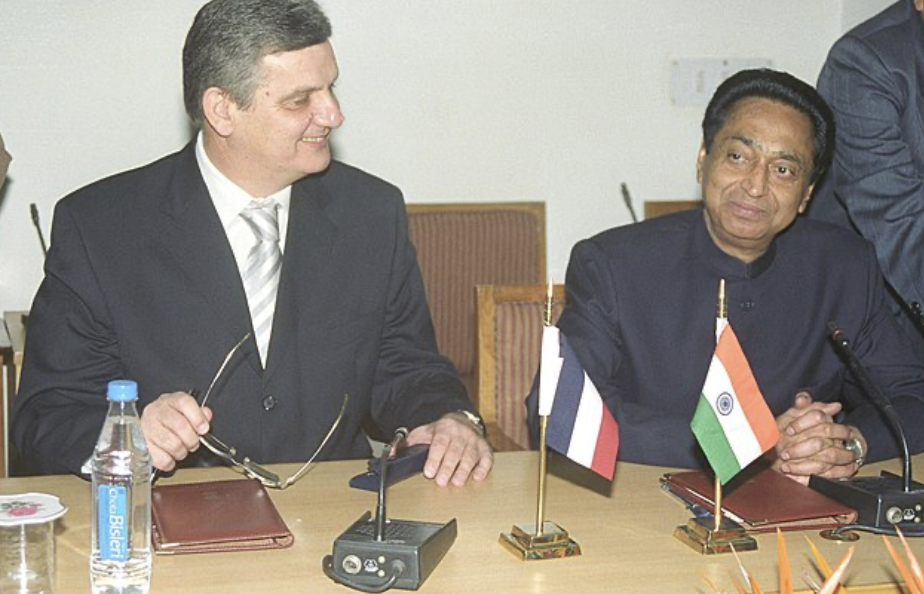The Compass
The George Washington University’s
Undergraduate International Affairs Blog
Silence Is Not Strategy: India’s Multipolar Problem
This article specifically analyzes how India’s long-standing strategy of nonalignment has become increasingly ineffective in today’s multipolar global order. Where India once leveraged geopolitical balancing to maintain its autonomy and influence, its continued strategic hesitation today erodes its influence and foreign trust in its leadership of the Global South. By analyzing India’s geopolitical stance towards the United States, Russia, China and other emerging global powers, this piece argues that ambiguity is no longer an asset for India and the nation must instead adopt a clearer geopolitical identity to retain its global influence.
The Politics of Eurovision
On December 4, 2025, Israel was cleared to compete in Eurovision. A few hours later, Ireland, Spain, Slovenia, and the Netherlands pulled out of the competition. On December 10, 2025, Iceland joined the boycott. This ongoing controversy demonstrates the inherently political nature of Eurovision. Politics have long been a part of Eurovision and will remain a part of the competition for the foreseeable future.
Sudan: On the Brink
Sudan is currently going through a civil war, fueled by a power struggle between the SAF and RSF. This has created a severe humanitarian crisis with millions killed, displaced, or starved. Failed peace efforts and international neglect worsen the issue while civil society fights for human rights amongst the instability.
The 25th Anniversary of Women, Peace, and Security: The Light that Needs to Burn Brighter
This October 2025 marked the 25th anniversary of the Women, Peace, and Security (WPS) agenda, a framework endorsed by UNSCR 1325. This resolution by the UN Security Council marked groundbreaking advancement for the international commitment towards women’s rights. During the United Nations’ annual WPS debate, speakers discussed the empowerment of women, but also the critical danger and conflict that women around the world are facing. During a time of various humanitarian conflicts and conservative leaders, the call for women to be represented in all facets of peacemaking is necessary for change.
France’s National Crisis
On October 6, 2025, French Prime Minister Sébastien Lecornu resigned less than 24 hours after forming a government and less than a month after his appointment. This marks the shortest government since the establishment of the Fifth Republic. Lecornu's resignation follows an emerging trend in French Politics, in which the government is frequently collapsing. This is sending France into a national crisis while undermining the legitimacy of French President Emmanuel Macron.
Japan Has Decided: Populism and Tariffs; Rice and Russia
On July 20th, the people of Japan decided to keep the Liberal Democratic Party (LDP) in power albeit with populist reservations. After a series of scandals, the LDP was in dire straits, but managed to keep a plurality of seats alongside its coalition partner the Komeito. Populist parties such as the Democratic Party for the People (DPP) and the Sanseito made strides in the polls while traditional opposition parties such as the Japanese Communist Party (JCP) and the Constitutional Democratic Party (CDP) stalled. The Sanseito however was mired by a scandal just days before the election, having a candidate participate in an interview with Russian-owned media outlet Sputnik without party authorization. Russia was also shown to have been interfering with the election through social media as well. How Japan navigates these issues will ultimately determine the future of the LDP, CDP, JCP, and other parties' futures.
The Promises and Perils of Iraq's Development Road
Iraq's Development Road aims to transform the Middle Eastern country into a crucial trade corridor on the Eurasian continent, reducing dependence on oil by the country. Stretching from the Gulf of Persia to Turkey, this megaproject promises regional connectivity and economic/job stimulation for many. Despite this, political fragmentation and chronic corruption threaten the success of such an ambitious initiative. This brief examine both the project's economic promises and downfalls, arguing that without correction from within the Development Road will never materialize.
The Erosion of US Soft Power: The Strategic Implications of US Global Disengagement
Since World War 2, US leadership has shaped global cooperation through soft power, trade, and military alliances. Recent policy shifts, such as tariffs, reduced international engagement, and the closure of essential diplomatic institutions, have weakened that influence. Allies are reevaluating their reliance on US defense and economic relations, turning to regional alternatives. These developments reflect a possible transition to a multipolar world order and a diminishment of the US in global standing if these actions continue.
Mexico’s Power Grid Is a Soft Target in a New Era of Cartel Terrorism
This brief examines how energy infrastructure has historically been targeted as a tool of asymmetric warfare and why Mexico’s fragile electrical system is now dangerously exposed to similar threats. With cartel violence escalating and the potential for a renewed war on drugs, the brief explores the structural vulnerabilities of Mexico’s energy infastructure, which remains underfunded and ill-equipped to withstand deliberate attacks. Given that Mexico imports roughly 60% of its natural gas from the United States, any disruption to its grid poses serious risks not only to domestic stability, but to the U.S. energy market and cross-border cooperation. Recognizing this interdependence, the brief outlines actionable solutions from physical fortification strategies modeled on Ukraine’s wartime grid defense, to financing mechanisms through the North American Development Bank (NADBank).
Techno-Authoritarianism and the Iranian Cyberspace
The issue brief examines the intensified digital repression during the recent "12-day war" between Israel and Iran, exploring how the Islamic Republic of Iran exploits cyber threats to justify internet blackouts and digital censorship. The article explores the development of the "Halal Internet," authoritarian partnerships, and online disinformation campaigns to dispel dissent. The article also underscores how international involvement and funding is needed to help promote digital freedom in Iran.
A New Age for Africa: AfCTA and RTAs as a Stepping Stone for Liberalization
Africa has long been central to the development of world and intercontinental trade as we know it; yet for centuries, it has been a major player in global economic development without being officially included in world economic forums and trade agreements. Since its decolonization in the late 20th century, African countries have worked restlessly to develop themselves, but face the continued obstacle of not being allowed to make decisions about their own economic fates. However, as the world has moved into the 21st century, African leaders have refused to be left behind economically, having signed the African Continental Free Trade Area (AfCFTA) Agreement to conduct international and intercontinental trade on their own terms.
The Impact on Migration Policy at the Forefront of European Politics
This article looks at how immigration policy has emerged as a major issue in European politics, contributing to government instability, the rise of right-wing populism, and shifts in mainstream party platforms. Focusing on the UK, Denmark, and the EU, it highlights the tension between economic needs, public sentiment, and human rights, and argues that coherent, cooperative reform is essential to address growing political divides.
The Kōchikai: How a Japanese Liberal Democratic Party Faction Went from Cooperation to Competition
This article focuses on the Japanese Liberal Democratic Party (LDP) faction called the Kōchikai (Big Pond Society) and how it has changed from more cooperative and collaborative stances to more dividing and antagonistic stances. It then shows how, while the majority of LDP factions are dissolved, these groupings can still be valuable to determine the possible policy stances a politician may take in the future.
Shigeru Ishiba, Kazuo Ueda, Yoji Muto, and the Japanese Economy & Trade
The Japanese economy and its trade are very complicated subjects with numerous aspects to it, but one way to look at them is through the lens of key figures. By analyzing the Japanese Prime Minister, Governor of the Bank of Japan, and the Minister of the Ministry of Economy Trade and Industry, it shows how they focus on different areas of the economy and how they can influence Japanese economic and trade policies. Through their individual qualities, it is possible to see how these figures compliment and contrast each other in their attempts to rejuvenate the Japanese economy.
Ishiba Diplomacy and What it Means for the US Latticework in the Indo-Pacific
While Ishiba's diplomatic outlook has been different than the views of his predecessors, this could be used to the advantage of the US. Ishiba has been more pro-Chinese than his predecessors and seems willing to work together with China on common issues. With US leadership in question throughout the world, and a possible Japan-US fallout looming over tariffs, now is the time to see what impact Ishiba's diplomatic strategy would have on the US' latticework strategy to unite the Indo-Pacific through a multitude of agreements between nations and whether it is possible to incorporate Ishiba's diplomacy into the US' strategy.
History of United States’ Relation to Greenland
This article looks at the history of US interest in Greenland, focusing on the changing motives behind its strategic importance over time. Recent comments from the Trump Administration have brought a spotlight to the historic trends of involvement with Greenland, shifting as a result of geopolitical, economic, and military priorities. From resource-driven interest to strategic involvement, this paper looks at the fluctuation of interest through administrations and foreign policy doctrines. Greenland has remained an important point of interest in the region.
From the People’s Power Revolution to Bong Bong Marcos: The Decline of Democracy in the Philippines
The People's Power Revolution against the rule of the dictator of the Philippines, Ferdinand Marcos that brought about the return to democracy in the Philippines occurred only a few decades ago. Following the strongman rule of President Rodrigo Duterte, Filipinos voted to elect President Ferdinand "Bong Bong" Marcos Jr. into the presidency in 2022. With Marcos' dictatorial pedigree and the dangerous precedents of Duterte, the future of Filipino democracy is gravely at risk and the potential for a new rise in authoritarianism in the Philippines is on the horizon.
Is BRICS a Threat to the Western World?
Since 2009, BRICS, originally comprising of Brazil, Russia, India, China, and South Africa, has evolved from a bloc of 10 of the world’s largest developing economies to a growing adversary of the West. With the recent inclusion of 5 new countries—Egypt, Ethiopia, Iran, the UAE, and Indonesia, BRICS now accounts for a quarter of the global economy and nearly half of the world’s population. This article explores BRICS’ progress towards its two primary goals—reducing global reliance on the US dollar and challenging Western hegemony and the US-dominated global order.




















